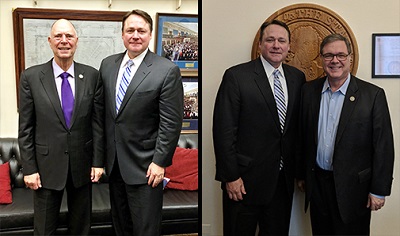Newsroom
NAFCU's RBC-delay provision advances out of committee

The House Financial Services Committee yesterday advanced out of committee a NAFCU-sought provision to delay the implementation of NCUA's risk based capital (RBC) rule by two years that is housed in the Foreign Investment Risk Review Modernization Act of 2018 (H.R. 5841). NAFCU has long advocated for a modification or delay of the rule, and the association's efforts proved instrumental in getting the language added to H.R. 5841.
The legislation, introduced by Rep. Robert Pittenger, R-N.C., deals with the Committee on Foreign Investment in the United States (CFIUS) but has language in Title VII that would delay the effective date of the RBC rule to Jan. 1, 2021. The language included in H.R. 5841 comes from the Common Sense Capital Relief Act (H.R. 5288), which was introduced by Reps. Bill Posey, R-Fla., and Denny Heck, D-Wash., in March. NAFCU President and CEO Dan Berger met with Posey and Heck last week to thank them for their ongoing efforts to protect the industry from the adverse effects of this rule.
Responding to an attack against the provision from the American Bankers Association, NAFCU Executive Vice President of Government Affairs and General Counsel Carrie Hunt sent an email to the House Financial Services Committee to set the record straight.
"This delay would actually give credit unions parity with the length of time that community banks had to come into compliance with new capital requirements under Basel III," Hunt wrote. "It is important to note that despite what critics claim, credit unions still have robust capital standards in place without the RBC rule, and will continue to do so should this provision be passed."
Hunt also referenced a letter from NCUA Chairman J. Mark McWatters to Posey in which McWatters offers his support for delaying the implementation of the agency's RBC rule. She noted that the ABA was attacking this provision at the same time that they "are seeking capital relief and exemptions from the Volcker Rule" and called for them instead to work with NAFCU on regulatory relief for all community institutions.
U.S. Defense Secretary Jim Mattis has also urged that CFIUS legislation be included in the National Defense Authorization Act (NDAA), which is currently under consideration in the House. NAFCU will continue to advocate for House members to include a delay of the RBC rule in the legislation.
While NAFCU supports an appropriate RBC system for credit unions, the NCUA's rule as written will have a negative impact on the credit union industry. The association has been opposed to NCUA's RBC rulemaking since its passage and has urged the rule be modified or effective date delayed, particularly because of increased regulatory burdens and costs.
Share This
Related Resources
Add to Calendar 2024-06-26 14:00:00 2024-06-26 14:00:00 Gallagher Executive Compensation and Benefits Survey About the Webinar The webinar will share trends in executive pay increases, annual bonuses, and nonqualified benefit plans. Learn how to use the data charts as well as make this data actionable in order to improve your retention strategy. You’ll hear directly from the survey project manager on how to maximize the data points to gain a competitive edge in the market. Key findings on: Total compensation by asset size Nonqualified benefit plans Bonus targets and metrics Prerequisites Demographics Board expenses Watch On-Demand Web NAFCU digital@nafcu.org America/New_York public
Gallagher Executive Compensation and Benefits Survey
preferred partner
Gallagher
Webinar
Add to Calendar 2024-06-21 09:00:00 2024-06-21 09:00:00 2024 Mid-Year Fraud Review Listen On: Key Takeaways: [01:16] Check fraud continues to be rampant across the country. Card fraud is affecting everyone. [04:31] Counterfeit US passport cards are just another new toolbox in the bad actors’ toolbox. [07:21] Blocking the fallback is the only way to defeat counterfeit cards. [11:17] The best way is constant education to your members in as many channels as you can. [13:02] We are still seeing overdraft lawsuits. Make sure the programming you have at your credit union matches what you have displayed for the members. Web NAFCU digital@nafcu.org America/New_York public
2024 Mid-Year Fraud Review
Strategy & Growth, Consumer Lending
preferred partner
Allied Solutions
Podcast
Add to Calendar 2024-06-21 09:00:00 2024-06-21 09:00:00 The Evolving Role of the CISO in Credit Unions Listen On: Key Takeaways: [01:30] Being able to properly implement risk management decisions, especially in the cyber age we live in, is incredibly important so CISOs have a lot of challenges here. [02:27] Having a leader who can really communicate cyber risks and understand how ready that institution is to deal with cyber events is incredibly important. [05:36] We need to be talking about risk openly. We need to be documenting and really understanding what remediating risk looks like and how you do that strategically. [16:38] Governance, risk, compliance, and adherence to regulatory controls are all being looked at much more closely. You are also seeing other technology that is coming into the fold directly responsible for helping CISOs navigate those waters. [18:28] The reaction from the governing bodies is directly related to the needs of the position. They’re trying to help make sure that we are positioned in a way that gets us the most possibility of success, maturing our postures and protecting the institutions. Web NAFCU digital@nafcu.org America/New_York public
The Evolving Role of the CISO in Credit Unions
preferred partner
DefenseStorm
Podcast
Get daily updates.
Subscribe to NAFCU today.
